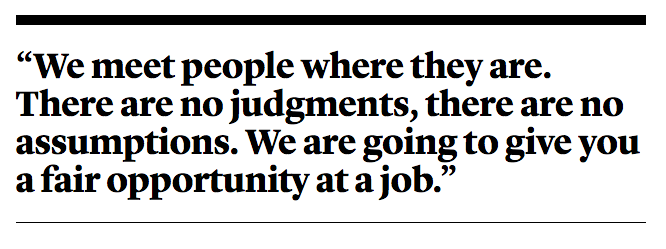The Atlantic: Mastering ‘Life and Knife’ Skills in a Training Kitchen
Arnesa A. Howell, Contributor | Dec 25, 2015
Former convicts learn essential life and culinary skills in a tailored program at D.C. Central Kitchen.
Terrell Nicholson knows the streets. “I was attracted to the fast money, the fast women, fast-paced everything,” he recalls. Regular 9-to-5 jobs like grill cook or nighttime stock came easy, but each one slipped away because the “thrills” of living “that life” always lured him back, he says.
“It was never a problem for me to get a job because my mom always instilled that work ethic,” says the soft-spoken Nicholson. “[The challenge] was just keeping it, because mentally, I was out in the stratosphere—out in the streets.”
Sometimes, the days blurred into one another. He’d stay awake all night and go to sleep in the daylight. Waking up meant finishing whatever cup he’d been drinking from before he went to bed; then, smoking a Newport, showering, eating; and laying out his baggies, scales, and razors, “illegal paraphernalia” that served as his “tools for the day” for cutting, weighing, and packaging the crack cocaine and heroin he was dealing. Finally, he’d turn on his cell phone and wait for that first call.
“Before I discovered the Culinary Job Training Program, my life was risky, it was exciting, it was dangerous, it was foolish,” says Nicholson. “I was into the street life. I sold drugs, I hung out with guys who were no good.”
For Nicholson, 31, that’s a life he easily recalls but is working hard to overcome. Mere months out of prison after serving almost three years on a conviction for distribution of marijuana, cocaine, and heroin, and possession of a firearm, Nicholson transitioned into halfway housing in Southeast Washington, D.C. and applied to D.C. Central Kitchen’s Culinary Job Training Program, a skills initiative for unemployed, homeless, and formerly incarcerated men and women to pursue careers in the culinary arts. While the 25-year old program helps a cross section of individuals, an estimated 65 percent have spent time behind bars.
Nicholson is weeks away from graduation, on track to join the list of 1,500 graduates who worked to rebuild their lives by learning the art of cooking.
With its teaching of “knife and life” skills, the Culinary Job Training Program is a game-changer for those who have a history of encounters with the criminal-justice system. For graduates of the program, the recidivism rate is 6 percent. The latest national estimates on recidivism from the Bureau of Justice Statistics show that roughly 45 percent of individuals released returned to prison or jail within five years.
On a Wednesday morning, 13 students from Class 102 filter into a small conference room and crowd into seats around a table. The wall displays taped images of kitchen work: a paring knife, al dente, microgreens. Affirmations of success—commitment, consistency, confidence, and compassion—are posted, too.
It’s week seven of the 14-week Culinary Job Training Program, and students are meeting for a joint workforce-development session before heading off to their one-month internships at restaurants and food-service providers across the D.C. area. Robert Mann III and Chris Lyfoung, the program’s two workforce-development and graduate-support coordinators, stand at the front of the room. Nearby is Jeff Rustin, the self-empowerment coach. With arms folded behind his back, Rustin starts to speak.
“It’s a battle when you leave out here; it’s a battle. There’s so much temptation, there’s so many things that cause you to slip—people, places, things. Just because you got the D.C. Central Kitchen uniform on—yeah, that’s great, but you still have those vices that keep pulling you,” Rustin says.
“Your No. 1 goal is to do what?”
“Graduate,” the class responds in unison.
“Let nothing get in your way. Nothing.”
For many students, attitude is the biggest obstacle to success. It’s a core issue addressed in the self-empowerment sessions, daily classes held during the first seven weeks of the program.
“It has absolutely nothing to do with cooking, but everything to do with changing your thinking, changing your behavior, looking back at things or unsuccessful behaviors that have happened in the past, learning how to communicate, learning how to say what you feel without aggression,” explains Marianne Ali, director of Culinary Job Training for D.C. Central Kitchen.
Those who’ve worked closely with participants say the group discusses anger management, substance abuse, and the emotional issues surrounding self-esteem and self-hate. The closed-door policy to outsiders encourages open dialogue between students during sessions.
Self-empowerment is the single most important element in the training, notes Ali. It helps students tap into their emotions and access forgotten lessons from childhood, she says, so they realize they are worthy and capable of doing what they want in life. Without it, there’s no commitment to gain the life and job skills needed to succeed, adds Lyfoung.

Terrell Nicholson crosses the street after getting off the bus in Southeast D.C. on his way back to Hope Village halfway house after his last day of an internship at the Ritz-Carlton Hotel in Georgetown. (Emily Jan)
“I’m going to be a business owner,” says Nicholson. He’s sitting in a conference room at Central Union Mission. He and his classmates attended the latest graduation ceremony for DCCK’s satellite culinary-job-training program with the Mission. It’s a preview for Nicholson’s own graduation in January. Allowed to leave early from his internship at the Ritz-Carlton in Washington, he’s still wearing the Culinary Job Training Program uniform: a black chef’s cap, houndstooth-check pants, and white chef’s jacket. But his aspirations stretch beyond the kitchen.
David Hill, who was a clinical social worker with the Culinary Job Training Program from August 2013 to December 2014, describes the sessions as “group therapy” that mines deep emotion. “Initially, there’s lot of ambivalence because they’re used to institutionalized settings where if you opened up, you would open yourself up to being a victim. It took a while for them to trust … to trust society, to trust themselves,” says Hill, now the program director of the mental-health unit for Family Matters of Greater Washington. “As they started to do that, they started to succeed.”
He credits self-empowerment for breaking that “prison mentality” and giving the formerly incarcerated an opportunity to lay a foundation for change. “No one really wants to touch that population, and D.C. Central Kitchen does a marvelous job of getting returning citizens to really look at who they are, where they want to be, and who they want to be.”
The workplace-development classes get down to the basics of employment preparedness by teaching dress etiquette, time management (“Being on time is late; be there early,” insists Mann), and resumé workshops; instructors also conduct mock interviews when students return from their internships, and offer a guided job search (some interns receive offers before graduation). Every three weeks, there’s a series of one-on-one evaluations to keep students on track and motivated.
Afternoons are reserved for the kitchen, with hands-on training. Instructors guide students in whipping up classic dishes like airline chicken breast. Students learn knife skills and kitchen safety. They work with soups, sauces, poultry, fish, and meats. Here, food is at the heart of DCCK’s mission “to strengthen bodies, empower minds, and build communities.”
A recent addition to the culinary mix: the introduction of literacy and numeracy to strengthen students’ reading and understanding of numbers when working with measurements and recipes in the kitchen. (Ex-offenders generally have lower levels of literacy than the general population, according to a joint 2014 report by the RAND Corporation and the Bureau of Justice Assistance.) Students test for ServSafe food-protection-manager certification, nationally accredited for food safety.
There’s also an emphasis on stable housing, transportation, and health. If housing is a problem, students are referred to federal or city recovery shelters like Central Union Mission. When changes in behavior hint at an underlying mental-health issue—undiagnosed or the result of skipped meds—there’s a licensed clinical social worker on staff for evaluations. Staff can connect those struggling with substance abuse and addictions to resources. Weekly transportation stipends—$75 to $80, says one student—ensure travel to DCCK and internships. Together, these efforts appear to be working. The program has a 90 percent job-placement rate.
This year, 105 students are expected to graduate; half were previously incarcerated. Historically, 70 percent of program participants have been African-American men; roughly 30 percent have been black women—below Ali’s goal of 50 percent.
She says that target can’t be met without addressing the unique challenges facing women, often the caregivers of the family. A daycare center would help mothers attend class. “They could drop their kids off and know that they’re in a safe and secure place, learn how to cook, and how to redirect their lives,” says Ali.
The training program costs $1 million a year to run at no cost to students. The uniforms, books, daily lunches at DCCK are all covered through sponsorship.
Finding meaningful employment after incarceration often eludes returning citizens because of the stigma of having a criminal record.
Nicholson, who’s been in a revolving door of incarceration since the age of 18, used to check the box on job applications and write in “felony for distribution.” He never got a callback or interview. Experience taught him to write in, “Will discuss upon interview.” At least that way, he recalls, he’d have a chance.
So should employers and patrons be concerned? “I’m sure the red flag of awareness needs to be there, but allow people to prove themselves,” says Anand Shantam, a culinary-job-training instructor and 2011 program graduate.
But the students aren’t the only ones facing challenges. The building housing the culinary-training program is deteriorated and cramped, which is why the workplace-development and self-empowerment classes are divided. Twenty students originally enrolled in Class 102, way too many for the nine computers in the onsite lab. Staff says they’ve had to share their computers to accommodate the technology shortfall. “We’re busting at the gills here,” admits Mann.
Another question: Is 14 weeks enough time to change the mind-sets of individuals who’ve sometimes spent decades behind bars, experiencing trauma and abuse with lingering effects? Mann says he’d like to see the program extended beyond 14 weeks because “the soft skill sets that we are attempting to move forward can’t be done sometimes” in that span. As D.C. Central Kitchen CEO Michael Curtin Jr. says, it’s “absurd” to think that at 14 weeks a person’s “head and heart can be changed in a way that we would not have to worry about what’s going on.”
Still, Curtin adds, “We have learned that we can’t go a lot longer because people really want to move on.”

